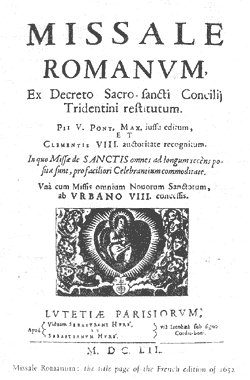Is history repeating itself today?...
|
In today's Church "renewal" many churches, convents and seminaries are being closed, and those that remain open are teaching a new brand of Catholicism that seems much more like Protestantism. If we were to recall the situation in Catholic Europe, where after a very agonizing period of "reformation," many countries found themselves Protestant, we would have to ask ourselves whether history were repeating itself today. To help faithful Catholics answer this question we present the following imaginary interview with Thomas Cranmer, Archbishop of Canterbury (1533-1556), who was the right-hand man of King Henry VIII, and a major Protestant reformer. In this interview, we meet Archbishop Cranmer on 12 June 1553, just after he has succeeded in bringing into force the last of a long series of Church reforms. All the responses of Archbishop Cranmer in this interview are based on research from historical sources. Those wishing to find out more may consult The Reformation in England, or The Life of St. John Fisher by P. Hughes, or Cranmer's Godly Order by Michael Davies. —by John Thomson |
The Angelus: Today we have with us Thomas Cranmer, Archbishop of Canterbury. How are you today, Your Grace?
Cranmer: Fine, thank you.
The Angelus: Your Grace, today you finally succeeded in getting royal assent to your newest series of Church reforms. How do you look upon these latest reforms?
Cranmer: I see them as the culmination of years of hard struggle in bringing about Church reform.
The Angelus: Yes, I'm sure it hasn't been easy and that it has taken you many years to get to where you are now. How did it all begin?
Cranmer: I suppose it began for me when I became Archbishop of Canterbury.
The Angelus: I recall that you took an active part in the divorce of King Henry VIII from Catherine of Aragon within a month of your taking office. Do you consider more liberal divorce laws a big part of your reform?
Cranmer: No, not a big part. Henry's divorce from Catherine provided a political opportunity for me to become Archbishop of Canterbury. I was the only priest the King could trust to give him the divorce he wanted and, so now in my current position, I have power. It is so much easier to reform the Church from the positions of power on the inside than to try to do it as a simple priest or from the outside.
The Angelus: Let's discuss your Church reforms which have quite drastically changed every aspect of the Church in England. In your opinion, why were these reforms necessary?
Cranmer: Let me first clarify a point in your question. You should say "the Church of England" and not "the Church in England." The difference is not a small one, and has a lot to do with the answer to your question. To respond: I and the other reformers have come to see the necessity of ending Rome's influences over the local churches. We recognize that Rome has been in error for many centuries and that we must return to a simpler Church, closer to the people as had existed in Apostolic times. What we need is an English Church for the English people.
The Angelus: But the Church "of the people" in Apostolic times was the Church of Rome. Besides this, the Church of Rome pre-existed the Church of England by some five hundred and fifty years. Shouldn't the Church of Rome, which goes back to St. Peter, have some primacy over the Church of England?
Cranmer: Age isn't the point. There's a principle of the rights of the English people at stake here.
The Angelus: Which of your reforms do you consider to be the most important?
Cranmer: The liturgical reforms.
The Angelus: Why the liturgical reforms? I thought that doctrinal, or even Church Law, reforms would have had greater importance.
Cranmer: The liturgy is the most crucial area to change since it is the liturgy that the people are in contact with week after week. Without changing the liturgy, the other reforms would have had little or no effect on the thinking of the average person. As Martin Luther said: "Once the Mass has been overthrown, I say we'll have overthrown the whole of Popedom."
The Angelus: But others such as Bishop John Fisher have said that "he who goes about to take the Holy Mass from the Church, plots no less a calamity than if he tried to snatch the sun from the universe."
Cranmer: That very quotation you've just cited shows to what extent Bishop Fisher and others like him have been brainwashed by the Romish doctrines!
The Angelus: But as a Catholic bishop, you once believed the Catholic doctrines taught by Rome.
Cranmer: I admit that I—and the other reformers and bishops as well—used to believe all the Romish doctrines. Fortunately though, I and the others, have managed to see the error in the Romish Latin Mass and we have rejected Rome's teachings on it.
The Angelus: But the Roman Rite comes from the Latin translation of Christ's first Mass at the Last Supper, translated by St. Peter himself, and although not written down for the first four centuries, it has been faithfully preserved and given to us by sacred Tradition with few additions and nothing ever deleted...
Cranmer: As I've already said, somewhere along the way, the Roman Church has erred, because the Romish Latin Mass clearly manifests the belief that the bread and wine really become the Body and Blood of Christ, and that offering of this Body and Blood is a true sacrifice. To really understand the errors in the Romish Mass, let me quote some Protestant theologians on the subject. For instance, Martin Luther of Germany called the Mass "sacrilegious and abominable," filled with "idolatry and impiety." Martin Bucer, also from Germany, said that "the bread and wine are symbols," and that "Christ the Lord is not present in them." John Calvin of Switzerland called the belief that the Mass is a sacrifice a "horrible abomination" and a "pestilential error" brought about by the work of Satan himself. Henry Bullinger, also of Switzerland, hailed the call for a return to "apostolic simplicity" and an end to the Romish idea of sacrifice. Then we would consider our own English bishops. Hugh Latimer, Bishop of Worcester, called the Romish Latin Mass "the most horrible blasphemy" and pointed out that the belief that it is a sacrifice has even "brought innumerable souls to the pit of hell." John Hooper, Bishop of Gloucester, called it "a sacrifice of antichrist," saying that "the Mass ought to be abolished and the Holy Supper of the Lord be restored." Finally, John Bale, Bishop of Ossory, said that "no sacrifice is the Mass, nor yet good work; but a blasphemous profanation of the Lord's holy supper, a manifest weakness, a horrible idolatry, and a foul abomination."
|
"Once the Mass has been overthrown... —Martin Luther |
The Angelus: Let us not forget that you yourself have called the sacrificial aspect of the Mass "the foulest and most heinous error that was ever imagined." And we should also mention the Pastoral Statement signed by several English bishops: "The adoration of the sacrament with honor due to God, the reservation and carrying out of the same... the Mass to be a propitiatory sacrifice... or a work that pleaseth God—all these we confess to be Antichrist's doctrine."
Cranmer: Yes, precisely. And thus you have our position that the errors in the Romish Latin Mass are not superficial but are integrally part of the Mass itself. And so in the reforms we saw the necessity of not merely small changes to the existing Romish Latin Mass which has obviously been so corrupted by Rome that it is beyond correction, but of a whole new liturgy, a radical return to the simplicity of the times of the Apostles.
The Angelus: But we have the witness of many Christian men, women and children who died as martyrs for defending the Faith! They believed the Mass was a sacrifice, and this Mass nourished their Faith.
Cranmer: They were, unfortunately, victims of ignorance and superstition.
The Angelus: But if you eliminate the idea of sacrifice from the Mass, then what is there to replace it?
Cranmer: The new emphasis is on the meal, the banquet.
The Angelus: So in your view the problem with the Latin Mass was not merely one of language.
Cranmer: Of course not! The switch from Latin to the vernacular was merely a diversion tactic to help us accomplish two goals: one, to begin to break the peoples' ties with Rome, and two, to be able to introduce an entirely new liturgy. Anyone with an education can tell that the new liturgy is not simply a translation of the old Latin, but an entirely new creation. Fortunately for us, the peasants can't read.
The Angelus: You have indeed succeeded in introducing this new liturgy, but you did not introduce all your liturgical changes at once but in stages. Could you elaborate on this point?
Cranmer: One has to understand human nature. People generally do not like change, particularly changes that conflict with their beliefs. However, people are more likely to accept a large number of such small changes made over an extended period of time rather than one such big change made all at once.
The Angelus: I call it a willingness to make small compromises with one's beliefs.
Cranmer: That may be your opinion and you're entitled to it. Naturally, I look at the whole thing differently. The Romish beliefs that our people were in error had to be changed. To accomplish this we made changes slowly. We started with the Catholic Romish Latin Mass. We introduced minor changes to it—sometimes one at a time, sometimes a few at a time—and when the process was completed, we no longer had a Catholic Romish Mass in Latin at all but a Protestant memorial service of the Supper of the Lord in the vernacular, which in our case was English.
The Angelus: It sounds like a brilliant strategy, but what if someone didn't accept one or more of your small changes?
Cranmer: Along with the changes we included sanctions—threats basically. If people didn't accept the changes promulgated by the King's Privy Council and continued to use the old Romish Latin Mass, we threatened them with fine, imprisonment and even excommunication. The majority of people don't want to become martyrs just for the sake of a few small changes. The really big weapon we had was obedience.
 Henry VIII Holbein |
Good people don't want to be disobedient. So if anyone didn't like the changes we made, we simply told them: "The King wants these changes which have been promulgated by the Council, so if you don't accept them, you're being disobedient to the King. You must obey the King!" After we said that, the people generally accepted the changes, except for the really stubborn ones—and these we had to punish.
The Angelus: Many see Bishop John Fisher as a symbol of such stubborn opposers to any of your reforms. For example, Bishop Fisher said that "the fort is betrayed, even by them who have sworn to defend it." By this, he was referring to the other English bishops, including you. What do you think of Bishop Fisher?
Cranmer: Fisher was a rebel. He didn't recognize the legitimacy of the reforms or the supreme authority of the King. Quite simply, Fisher lacked the common sense to realize that the King, the Council and the overwhelming majority of the bishops, priests and lay people couldn't all be wrong—I mean, there's safety in numbers. Despite our trying to reason with him, Fisher stubbornly maintained his position. His continued disobedience was causing sympathetic reactions from many disloyal subjects. In the end, the King had no choice but to deal harshly with him.
The Angelus: But don't you think that executing him was a bit too harsh? Bishop Fisher was 65 years old when you had him put in prison. Certainly you simply could have kept him there and he would have died soon enough without publicity! By executing him you made a martyr out of him and even encouraged more followers. [Editor's note: Bishop John Fisher was executed June 22, 1535, and was canonized by the Church as a martyr for the Catholic Faith.]
Cranmer: The execution was harsh but necessary. Fisher was becoming more and more of a problem—a real embarrassment—to me, to the King, to the council, and to all the other bishops. If he couldn't be convinced to join us, he had to be silenced—once and for all.
The Angelus: Were you not also afraid that Bishop Fisher might consecrate other bishops who would have helped to spread his ideas?
Cranmer: Certainly, if Fisher had consecrated bishops who thought the way he did, there would have been no way to stop his rebellious movement. However, if the truth be known, the real reason that Bishop Fisher was executed was that he stubbornly clung to the Church of Catholic Rome, and he saw himself as the lone defender of those Catholic beliefs that Catholic Rome had always taught. The execution of Bishop John Fisher was inevitable because the "Catholic beliefs that Catholic Rome had always taught" were no longer acceptable to us for the many reasons that I've already given to you.
 Bl. John Fisher Both by Holbein |
The Angelus: Tell us about some of the changes you made and how and why you made them.
Cranmer: Certainly. We began our liturgical changes when Edward VI, son of Henry VIII, took the throne.
The Angelus: I would have thought that Henry VIII was the great reformer.
Cranmer: Henry VIII was not at all interested in reforming the Church. All he was interested in was getting divorced and remarried! [Editor's note: Six wives in fourteen years!] He was actually quite conservative in other ways, and he totally frustrated all my efforts at pressing forward with the other reforms, especially in the liturgy.
The Angelus: But things were different with his son, Edward VI?
Cranmer: Yes. When his father died, Edward became King when he was only nine years old. He was unable to govern effectively, so he let all the important decisions be made by Parliament and be enforced by his Privy Council. Both Parliament and the Council were dominated by reformers and those sympathetic to the reform. Therefore the Council merely enforced policies that the reformers had planned beforehand.
The Angelus: What about the actual reforms?
Cranmer: Oh, yes. Before any reforms were possible, we had to prepare the people. Thus we used the press to spread theologically liberal books so that our ideas could be planted in people's heads. Later on we also discouraged the use of the Bible translated from the Latin Vulgate—whose translation supports the Romish doctrines of sacrifice and the Real Presence—in favor of new versions of the Bible whose translations favored our teachings. Then, to change the people's belief that the Mass was a sacrifice and to cause them to believe it was a meal, we introduced—not all at once, of course—communion under both kinds, that is bread and wine, altars replaced by tables, the priest facing the people, the elimination of statues and ornate vestments, communion in the hand rather than on the tongue, as well as experimentation with different kinds of communion breads. And to change the people's belief that Jesus was really present in the Eucharist we introduced communion in the hand and forbade the priest to show reverence to the consecrated Host as he used to do in the Romish Latin Mass.
The Angelus: I'm not sure I see the significance of the priest facing the people or of communion in the hand.
Cranmer: It's really quite simple. At a sacrifice, a priest faces an altar upon which he makes his sacrificial offering to God; at a meal, a priest—who no longer acts as a priest but as a presider—stands or sits facing the people who are sitting around the meal table with him and together they share the meal. And as for communion in the hand, if people really believed that Jesus—who is God—was really present in the consecrated Host they would feel unworthy to touch it with their own hands—the priest's hands having been blessed by the bishop especially for this purpose. If they continue to receive the host in their hands, eventually the host will become for them like an ordinary piece of bread that they might receive at any meal. I hope you can see that both of these changes are quite effective in causing people to lose or change their beliefs.
 |
The Angelus: So, have you succeeded in changing people's beliefs?
Cranmer: No, not completely. However, I have complete confidence that in twenty years' time we will have succeeded in making the people passionately hate that Romish Latin Mass that they once so passionately loved.
The Angelus: Are you aware that the church, meeting in an ecumenical council at Trent, has already condemned your new teachings, your new sacraments, and the use of your new Bibles?
Cranmer: Yes, and thus the remain confirmed in their errors!
The Angelus: When you drew up your reforms you invited several people from the continent to help you. Who were they and why did you invite them?
Cranmer: For many years now we have seen ourselves as being isolated from the rest of the world and in many instances we have rejected the world's ideas as even being harmful to us. Now of course we see that it is preferable to open our doors to the world and its exciting new ideas. For this reason we decided to invite theological and liturgical experts from the continent, from several countries but mainly from Germany and Switzerland, to come to England to participate in the various commissions that were set up to reform the liturgy, canon law, the sacraments, the catechism, etc.
The Angelus: I had thought that the Protestant theologians who actually participated in the making of the new liturgy were invited only to be "observers."
Cranmer: No, those who participated played quite an active role. In fact, most of the new liturgy was written by them, and they have profoundly shaped my ideas of what the liturgy should be.
The Angelus: So then we can assume that all of you agreed on what kind of reforms you wanted?
Cranmer: Not completely. We all agreed on what we wanted to destroy. However, we disagreed on the best way to do it or what to put in its place.
The Angelus: What is the extent of your reforms?
Cranmer: We have reformed everything! We have changed the liturgy, the sacraments, the catechism, and we have revised outdated moral and doctrinal teachings. We have a new code of canon law and we also have reformed the method of training our priests and have made new rites or ordination.
The Angelus: One last question. It would now seem that you, Thomas Cranmer, Archbishop of Canterbury, and the other Protestant Reformers, have succeeded in bringing about all the reforms that you had intended. Surely now you consider your work to be completed. Where do you go from here?
Cranmer: Our work shall not be completed until the whole of the Catholic Church rejects the Romish Sacrifice of the Mass and accepts our reforms. I may not live to see our goal achieved, but it is our desire that it be achieved some day.
The Angelus: Well, Your Grace, that's all the time we have for our interview. Thank you very much for your candid responses. I'm sure our readers will find what you've had to say quite interesting.
Cranmer: My pleasure.


